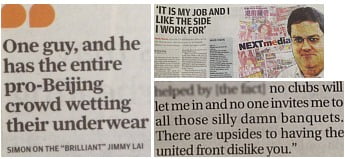The South China Morning Post has a columnist who regularly and tirelessly repeats much the same hand-wringing mantra: wouldn’t it be nice if everyone compromised and we had peace and harmony? She does it again today. It presupposes a political division between two sides each of whom can claim to fairly  represent similarly broad camps and each of whose arguments have some validity. That might summarize debate in democracies over, say, tax cuts versus welfare spending. But it has little relevance to political reform in Hong Kong.
represent similarly broad camps and each of whose arguments have some validity. That might summarize debate in democracies over, say, tax cuts versus welfare spending. But it has little relevance to political reform in Hong Kong.
One side here is an autocratic and dictatorial one-party state that rules by fear and has a long record of crushing opposition by force. (It is fronted locally by various Communist loyalists, shoe-shining tycoons and supine if not mercenary bureaucrats, but that’s a façade: this is all top-down puppet-master power.) The other side is a society that insists on keeping pluralism, openness and freedom, and wants representative government as well. There is no symmetry here, and no grounds for negotiation or compromise. The ‘autocratic’ side has all the real hard power; its opponents can only hope that it perceives an interest in not beating them into a pulp, and maybe even in granting a fairer administration.
Beijing’s methods to tame unruly Xinjiang do not bode well for Hong Kong. Chinese officials’ idea of winning hearts and minds includes forcing Muslim fasters to eat during Ramadan and – if that’s too subtle – stopping them from having babies. Swamping Hong Kong with Mainlanders and encouraging patriotism in schools seems to have backfired, and the rest of the world is watching, so Beijing does seem to accept that a somewhat more enlightened approach may suit Communist Party rule in our case. Purely on its terms, obviously. The word ‘compromise’ isn’t in the dictionary, though ‘acceptance’ and ‘submission’ are, and ‘gratitude’ would be nice.
The deck is stacked against them, but the pro-democrats are playing their scarily bad hand gamely. They reject attempts to lure them into conceding a rigged nomination system, and with bravado. The Democratic Party’s Emily Lau denounces Beijing’s version of democracy as North Korea’s. This is overdoing it: imagine North Korea offering its people a free choice of three candidates (they currently have to openly declare a ‘yes’ or ‘no’ for the latest member of the Kim dynasty), and with TV debates and mud-slinging, and you don’t have to live off grass. (Our current system is more North Korean.) Her colleague Albert Ho snubs the idea of Beijing’s guided democracy as a glass half-full, better than nothing. But there is no evidence that the current system would be less rotten in practice, even if quasi-democracy offends purists and international principles. The pro-dems have moral right on their side, but they could do better when it comes to practical arguments, not that the overweening sovereign power would listen.
It is pretty clear who should win such an unequal contest. You have no choice but to choose between two election models: no-choice and a limited hand-picked choice. The pro-dems are perhaps trying to stiffen the community’s resolve to resist the distasteful but only option for change on offer. But there are a lot of pragmatists in this town, who will see such a course as pointless.
So all Beijing has to do is sit back and wait. But no – it has to micro-manage and cajole and bully to absolutely ensure it gets its way. When broadcaster Robert Chow launched his ‘silent majority’ movement against the pro-democracy Occupy Central campaign it was presumably an act of opportunism, in the finest spirit of the reward-seeking instant-noodle patriotism that has embodied much of Hong Kong’s entrepreneurism since the 1980s. He probably never imagined that it would be hijacked by the United Front and used to intimidate lowly and innocent members of the community like some Cultural Revolution mob in the mid-60s. But here is an edited email from someone simply reporting what they have seen in a company with Mainland business links…
One employee, who is recently married with a baby, booked a bargain package holiday in Thailand for herself, husband and child. A ‘special’ deal because the flights were business class and the hotel a five star place. It cost about $10,000, or around one month’s salary for her. Unfortunately the dates clash with the Great Rally Against Occupy Central [next Sunday]. The travel agency refused to refund or change dates. She asked the manager if she could give the Great Rally a miss because of this. He said, ‘No, you must attend. This rally is too important.’
The intimidation here is not simply of the employee, but almost certainly of the boss, and probably of several layers up the chain of command through the United Front and Beijing’s Liaison Office officials. It was probably not planned to end up like this. I’d even guess that if Beijing’s higher-ups knew of this sort of thing – which is hardly isolated – they would call a halt to it on the grounds that Hong Kong is not Xinjiang, and such coercion is self-defeating. But that is how this punishment-powered, control-obsessed system works, and has to. And that’s why expecting ‘compromise’ from anyone is a joke.
Pro-democracy publisher Jimmy Lai’s CIA running dog Mark Simon confesses his role in trying to bring the Communist Party down in today’s SCMP, and spills the beans on the rewards of being an enemy of the people…

